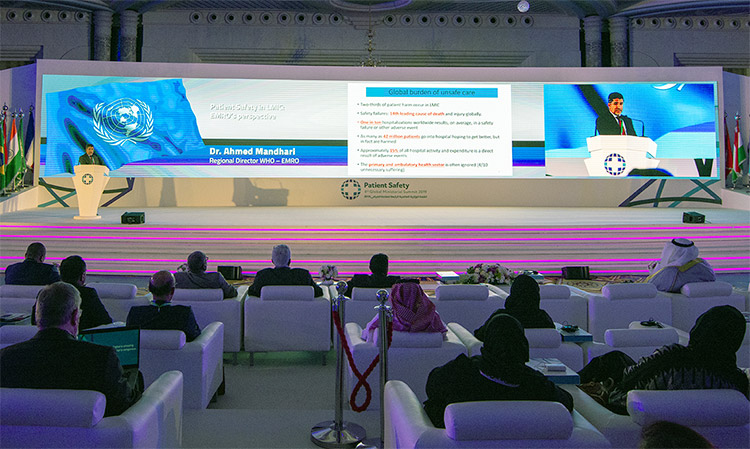
3 March 2019 ‒ The Fourth Global Ministerial Summit on Patient Safety is being held in Jeddah, Saudi Arabia, from 2 to 3 March 2019, with a focus on patient safety in low- and middle-income countries that shoulder two thirds of the global patient harm burden.
Patient safety in health care is a serious global public health concern and a major challenge for health systems everywhere. Adverse events are the fourteenth leading cause of death and injury worldwide and as many as 42 million people are affected by adverse events after hospitalization.
This is the first time that the summit is being hosted in WHO’s Eastern Mediterranean Region. It is bringing together international experts, political decision-makers and other stakeholders from more than 50 countries involved in the global movement for patient safety.
The summit aims to consolidate efforts to define strategies that will support the integration of patient safety as an essential element in achieving universal health coverage. This can be accomplished by enhancing leadership, raising awareness and fostering contextual applicability, particularly in resource-limited settings. Although improving patient safety has always been at the forefront of public health policy-making, greater efforts are needed to ensure patients receive harm-free health care services.
“Without quality, universal health coverage remains an empty promise. Even with increased access to services, health improvements can remain elusive unless those services are of sufficient quality to be effective,” said WHO’s Director-General Dr Tedros Adhanom Ghebreyesus. “Quality is not a given. It takes vision, planning, investment, compassion, meticulous execution and rigorous monitoring, from the national level to the smallest, remotest clinic.”
“Patient safety is not a luxury. There is an urgent need to foster a culture of safety. We should put special emphasis on low- and middle-income countries, place the patient at the centre of health care delivery and make their safety one of the essential standards of every health care system in our Region and beyond,” said WHO’s Regional Director for the Eastern Mediterranean Dr Ahmed Al-Mandhari. “I would like to thank Saudi Arabia for generously hosting this important summit in our Region. Promoting patient safety through different initiatives, such as the ‘Patient Safety Friendly Hospital’, is one of the key priorities of our Vision 2023 for public health in the Region, which calls for solidarity and action towards Health for All by All.”
Compromised patient safety represents a high economic burden; about 15% of all hospital activities and expenditure are a direct result of adverse events, costing trillions of dollars annually. The high economic burden of such preventable adverse events, especially in low- and middle- income countries, exceeds that of malaria, HIV and tuberculosis together.
During the 2-day summit, a Jeddah Declaration will be endorsed as a call for action for many actors at all levels of health care provision and delivery. It advocates for sustainable and scalable implementation of patient safety solutions and best practices known to improve care delivery systems, patient outcomes and safety cultures.
The Declaration calls, among other things, to promote patient safety in low- and middle-income countries, utilize digital health to support patient safety across the globe, promote patient empowerment and community engagement for patient safety, establish an international classification of adverse events and for countries to adopt human factors engineering strategies to introduce resilience and minimize medical device-related adverse events.
Related link
Vision 2023: Health for All by All
For more information:
WHO Regional Office for the Eastern Mediterranean:
Dr Mondher Letaief
Regional Adviser
Quality and Safety
Health System Development
Mobile: +20 102 801 1579
E-mail:
Omid Mohit
Technical Manager
Media and Communications
Mobile: +20 106 881 3340
Email:
Mona Yassin
Communications Officer
Media and Communications
Mobile: +20 100 601 9284
Email:


